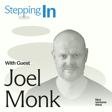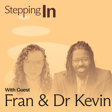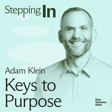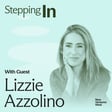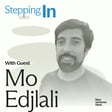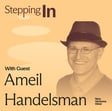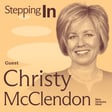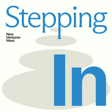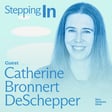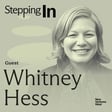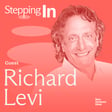Become a Creator today!Start creating today - Share your story with the world!
Start for free
00:00:00
00:00:01

Where Horizontal and Vertical Coaching Intersect
Michael Dolan, NVW graduate and founder of Truly Productive Leadership, joins Adam to talk about how addressing all the conflicting “to-do”s in our lives can actually empower our development by revealing what is really important to us.
Here are some of the topics covered in the Stepping In podcast episode Where Horizontal and Vertical Coaching Intersect:
- How to integrate hori
Transcript
Introduction: Meet Michael Dolan
00:00:09
Speaker
This is Adam Klein, graduate director, faculty member at New Ventures West. This is episode 13 of our podcast, Stepping In, a podcast where we delve into how integral coaching can address some of the most pressing issues we face as individuals, as communities, and as stewards of our planet. For this podcast, I sit down with Michael Dolan for a conversation about the place where horizontal and vertical coaching approaches intersect and empower greater development.
00:00:38
Speaker
Michael is a certified integral coach and a graduate of the professional coaching course. His sweet spot as a coach is supporting leaders for whom the development of deeper leadership competencies is being blocked by an underlying issue of lack of balance, stress, or poor self-management. In developing workflow coaching, Michael was influenced by his experiences working with David Allen, the creator of Getting Things Done.
Understanding GTD and Workflow Coaching
00:01:02
Speaker
Our conversation begins with Michael describing the process of a workflow coaching engagement.
00:01:08
Speaker
These days, most of the work I do is standard leadership coaching work, working with mid and high level leaders. But this specialty, I guess I would call it, of workflow coaching is something that I pull out of my toolbox here and there whenever it meets the needs of where a client is. It's really a process that I walk folks through this workflow coaching. For other coaches, usually what I say is,
00:01:37
Speaker
When I'm a workflow coach, I'm kind of a coach with a lowercase C. I'm an expert who's walking you through a very specific set of practices with a great set of knowledge behind it. I'm not an integral coach, capital C in those moments. I'm really more of an expert. But what I've seen and why I was excited about talking about this with you is I've come to appreciate over the years as I've been
00:02:07
Speaker
integrating these things, how powerful these practices of workflow coaching can be. And the basics of the approach, I'll just get that out here so people have a taste of what this GTD is all about. The basics of the approach, it's an approach that recognizes that one of the core
00:02:35
Speaker
the fundamental problems that human beings run into, especially these days, when it comes to managing all their commitments, is that we have more and more things we need our attention on, so much more than we did three or 40 years ago before email, before text messages, before Slack,
00:03:04
Speaker
for the computer revolution. And so we're in this place of always having more to do than time to do it in. And the question is, how do I be in a place of feeling complete about all that incomplete stuff? I'll say it again. How can I be complete about all that incomplete stuff?
00:03:34
Speaker
without having it spin in my psyche. We call them open loops, distracting us, waking us up. In the middle of the meeting, we're thinking about the birthday present for our mother. Or have we gotten that thing back from the bank?
The Benefits of GTD
00:03:48
Speaker
Or did I even ask for my direct report to get that to me yet? I can't remember. So the approach is all about recognizing that we've got all these open loops, emails, notes we take, things we're dreaming up in our head that are not
00:04:03
Speaker
really managed well. Agreements about that stuff are not managed well. So the approach is basically learning not to keep anything about any kind of commitments or agreements in your head. Always write it down, get it out, collect it. Your email inbox is already collecting right now. So have safe places where new stuff, new stimulus, new possible actionable stuff collects. And then sooner rather than later,
00:04:34
Speaker
do what we call processing and organizing of that stuff, which fundamentally looks like looking at each thing one by one and saying, is this actionable or not? Yes or no? Not, not just leave it there and figure it out later. Yes or no, is it actionable? And then coming down to the kind of the core insight that David Allen articulated was when you're putting aside actions for yourself for later,
00:05:01
Speaker
do enough thinking to name exactly what the very first physical visible step is. So instead of something occurring like, oh, I gotta figure out the Jones portfolio. And you might have on your list, Jones portfolio, exclamation mark. A list if you're using the GTD thought process looks like, hmm, what's about Jones proposal? What is the next action?
00:05:30
Speaker
Well, I can't do anything until I hear back from Sandy about that number that I need to integrate into the spreadsheet. Okay, that's the next action. It's on my waiting for list. I can't do anything until I hear from Sandy. If I haven't heard in a while, maybe I'll look back with her and ask again. So learning to force ourselves to come back to the question of what's the next action whenever something really is actionable and parking that in our list or our calendar, et cetera. And doing that on everything,
00:06:00
Speaker
creates the effect that we can really let those things go from our psyche. If we really trust that the tool, the set of lists we're using is two things, really complete and utterly clear. But the overall benefit is of peace of mind and a sense of clarity. And the nice side effect is you tend to get more of the right stuff done for yourself.
Horizontal vs. Vertical Coaching
00:06:25
Speaker
That's a long answer, a long summary. Oh, that's helpful. Um, toward the beginning of it, you were, you brought up this distinction between, uh, the way you said it was small C coaching, where you're the expert more or less of this process. And yet it's helpful in bringing it in. And then the way you were calling capital C coaching. And, uh, another way maybe that I've heard that talked about is where we're coaching in the horizontal space.
00:06:54
Speaker
So coaching at like, how do I support this person, my client, and becoming more skillful at something versus the vertical space, which is looking more at who do they take themselves to be in the world and how do I support them in having a different sense of themselves and then therefore how they respond to the world.
00:07:19
Speaker
And the question I have is what have you seen as you've been working with this and as you went through the professional coaching course in bringing these two things together, capital C, little C, horizontal, vertical, and how does this workflow process support people in the capital C coaching? Yeah, that's a great question. I appreciate that. The way I see it now is
00:07:46
Speaker
When I'm actually walking somebody through the process, it is definitely a horizontal kind of movement. But what I've seen in terms of the interplay of horizontal and vertical is that what I see in many of my clients, and I've definitely seen it in myself, is that when we do these horizontal-like practices, keeping our
00:08:16
Speaker
Agreements managed and clear, keeping very clear with ourself about what we are to do or not to do, keeping clear with others, and then actually following through with those things in a more successful way. There's something that happens in terms of our relationship. Our relationship to our agreements reflects our relationship to ourself. When we have more integrity,
00:08:45
Speaker
to what we're declaring to ourself we're going to do, and that becomes a virtuous cycle. There can be this opening of presence, because I've got a heck of a lot less stuff spent in my psyche. Even though I've got 62 projects right now, I'm talking to you and fully focused here. And there can be in that virtuous cycle more
00:09:14
Speaker
It's like more opens up in terms of, I guess you could think about it in terms of possibilities, conversations for possibility. When there is a sense of integrity to our word and presence and a sense of possibility that, hey, I can make something up and I can make it happen.
Finding Focus and Agency with GTD
00:09:36
Speaker
There's this opening to a wider possibility.
00:09:42
Speaker
or what can I create or do or what conversations can I have? What action can I take? What outcome matters to me? So not just, am I gonna get the Jones Project in on time this week? But what are my overall responsibilities and does that align with who I am and what matters to me? What is my sense of vision?
00:10:11
Speaker
what's the kind of taste and feel of that ideal scene that I envisioned for myself in five to 10 years? So it's a general, it can develop, it can be a fertilizer, these practices can be a fertilizer for things like presence, for things like higher level conversations and,
00:10:39
Speaker
fertilizer for integrity to ourself about how we function in the world. Because that's bottom line with this stuff is that I'm functioning and this list helps me not forget what I'm promising myself to function as. So this is kind of in the background of some of what you're saying and I'm curious how it starts to show up for people as they get into this workflow stuff and see
00:11:02
Speaker
And you said it a few different ways, but there's something that switches for some clients where they can see that life isn't happening to them and they have some agency. But where they come in, my sense is, is that their experiences, I'm overwhelmed, they have too many things to do and I need help so I can get them all done. But what supports that shift into feeling like an agent in their life?
00:11:26
Speaker
to get to these questions of, oh my gosh, is this really what I want to be up to? To feel that freedom, to ask that question. Yeah. What I see as some of the side effects of taking on these practices, basically of managing my commitments in a really intentional, consistent way, is when we are
00:11:57
Speaker
When I am regularly reviewing all of my commitments, when I'm regularly emptying my inbox, meaning what my commitments are and what they are not, there is a muscle that develops. And this is often a kind of a term that I see with clients as I work with them over time on this, where they begin to get that they really are the one that chooses what's mine and what's not, what's actionable and what's not.
00:12:27
Speaker
And sometimes people I've coached who came to this out of a sense of, or from a request of, I need to get able to do more work faster, end up getting to a point where they're in a bit of a crisis because they're actually seeing objectively outside of themselves or their inbox, all of the things that they've committed to, all the project outcomes they've said, yes, I'm going to get to that.
00:12:56
Speaker
All the actions, all the things they're waiting for, personally, professionally, they see them all objectively, in front of them, undeniably. And only what I found is only when we have that distance from those commitments where we can actually manipulate them and say, yes and no, not that one, yes, this one. Or we can see the bulk of the mall in one place. Can we really sometimes feel the impact of, whoa, that all I've said
00:13:29
Speaker
Is that really me? And then, as beginning back to your question, the conversation can, if there's capacity, ladder up to, well, what do you really want? What really matters to you? Where are you headed? And what have you potentially given up? So there's a lot of fruit on that tree.
00:13:56
Speaker
Yeah, absolutely. And it strikes me like this is pointing to the intersection of how horror, you know, what we were calling earlier is horizontal or small C coaching really is the path into capital C or vertical coaching, but I don't know how you could do one without the other. Yeah, yeah. And so it's sort of sometimes I hear people talk about why they do vertical.
00:14:22
Speaker
Well, what does that mean? Because in a lot of ways, our lives are lived in the horizontal by having lists to do and all of that stuff. And when we can bring in the dimension of the vertical to the horizontal, which is what I, one way I take this conversation of, so the horizontal, I have all these things to do, but then the vertical question of, well, but what's motivating me to do them? So bringing these motivations into the foreground supports us in our,
00:14:52
Speaker
skillfulness in being effective But it's only because it brings in this sort of kind of vertical component or the question of well, who am I in doing this? And if that changes and how might my response change? Yeah, yeah, and the gift of something like GTD is that most of us Most people walk around the world Not having a clue how many open loops they have swirling in their psyche
00:15:22
Speaker
about basically mismanaged agreements with themselves from I need to get cat food. I need to call my mom. Um, what about summer camp? Um, the credit card needs to be updated like times a hundred. And, um, that intersection, the, the, there's something that shifts in terms of what you're talking about in terms of the vertical and horizontal when
00:15:51
Speaker
When all of that stuff is consciously chosen and defined, and we put it through ourself, our heart, our head, what matters, who am I? I'm pointing to my heart. Does this really make
Addressing Resistance to GTD
00:16:10
Speaker
sense? Am I really open to what matters here, my head? Do I have capacity, energy, my body?
00:16:21
Speaker
when we put it through that process and externalize all that stuff that was undefined and we define it, our relationship to all that reality, all those agreements becomes very tangible instead of being kind of a ghost of a wisp of 55 open loops in my psyche that I'm always forgetting. And so we have this mirror of
00:16:49
Speaker
This is my life of action here in front of us. So for the seeker and for those who are on a path of spiritual inquiry or self-understanding, looking at that mirror of what's on our project list, what's on our action list can reveal a lot.
00:17:13
Speaker
Yeah, so what kind of pushback do you get when you sometimes when you start to bring this in? Sort of typical reaction that you experience fully usually There's this there's two things that come to mind one of the one of the pieces of pushback is gosh all of this Processing and organizing. This is a lot of work This is a lot of work. I could just be doing all this stuff instead of putting on lists. I
00:17:42
Speaker
Right. Um, that's one of the pieces of pushback and usually, um, during the course of, cause when I do a workflow coaching, I'll sit desk side with somebody for and walk them through the process over the course of a day or two full days, almost always. There's a point in the process where they're getting through their inbox. That would be a huge brain dump and they're processing all that stuff. They're closing all these loops.
00:18:11
Speaker
And they might have that kind of feeling or this kind of discomfort at the beginning of the day, but at a certain point, it's like they get to the top of the hill and they start going downhill in terms of like they get momentum. And instead of having a pushback about, this is a lot of work, what they start feeling is, oh my God, I feel so clear. I feel, my shoulders feel light.
00:18:39
Speaker
I feel excited and open because every time I clarify something and close the loop mentally, there's something in me that knows I don't have to hold on to it anymore. It's in that trusted external structure in a much better way than it would be if it was just a random trigger list of words that were unthought through. And so there's this, almost always there's this
00:19:08
Speaker
almost like this woo-hoo moment where they're like, come on, give me more. Let's get through everything. I need to close all these loops because I feel clear and present and it's freeing. So that's one of the patterns that I see. And the other response that I have sometimes to that pushback about this is a lot of work. When folks say, this is a lot of work, processing, making lists and processing all this stuff,
00:19:38
Speaker
I could just be doing it. What I say is, well, go ahead, try. Because it's impossible to do. We always have more to do than time to do it in. It's learning to slow down a little bit on the front end, so as I'm processing my emails or my notes, so that later I can be free and move swiftly if I need to or want to. But you don't get the gift of the freedom and clarity later
00:20:09
Speaker
without slowing down just a little bit on the front end to grab and name and park all that stuff for later. And the beauty of it is people typically have the experience with that. They do have to think about all that stuff that comes at them a little bit more than they're used to, but not nearly as much as they're afraid they need to.
00:20:39
Speaker
Well, what's occurring to me is what kind of like upfront and you've, you've said it before, like capacity development. So what capacities is a person being invited into at this initial stage? And, you know, you're alluding to one here, but the other one that is occurring to me is like, what's the capacity to be able to keep at bay the sense of urgency of, well, I just need to be in action mode on getting these things done.
00:21:06
Speaker
but what is the invitation to? Well, if you develop this capacity to tolerate maybe some anxiety, you'll start to see a shift. Is this making sense what I'm pointing to here? It seems like there's something being built there at the front end that allows them to be able to hold at bay this impulse to just jump into getting things done without having the process part first.
00:21:33
Speaker
Yeah, you're talking about in the moment where somebody says, maybe I could use a new way of handling and managing my commitments. Do I actually have the courage to stop the wheel and sharpen the saw? Yeah, exactly right. What is going on there that some people can do that and others are like, well, yeah, I'll do that, but not right now because this is too urgent.
00:22:02
Speaker
And then that sense never goes away or it always wins out. Yeah. Yeah. Sometimes it's about, um, really feeling the pain of it. And, uh, you know, like having a serious, serious issue happen because of a dropped ball or, uh, um, I'm thinking about a client I'm, I was just talking with today, uh,
00:22:30
Speaker
for whom it's clear that there's been a great loss of trust with many of his colleagues about, do they trust that when he agrees to do something, he will do it? And feeling being confronted by the pain of what's not working with our own, what I would call self-management. I use it term in a slightly different way than usual.
00:22:59
Speaker
Often that be you know, kind of hitting a certain kind of bottom with that Can create a wait. Is there a different way to do this? And do I have the time to To adjust but yeah, it is quite a big commitment to to take on This GTD thing because it usually takes about a good day and a half or two days of
00:23:27
Speaker
Collecting everything that's got your attention and all the backlog of your life and running it through this process for the first time The good news is that only has to happen once but You know, you got to create it create a new starting point Which is tough and Not not everyone can be Is up for it or has the opening for it, right?
Conclusion and Feedback Invitation
00:23:53
Speaker
But an important one because otherwise
00:23:57
Speaker
who's running our life here? Yeah, it's cool stuff. It's a joy for me to do this kind of work as a coach mixed in with longer term capital C coaching work, I guess you could say, because very often there's a
00:24:27
Speaker
There's a payoff. Maybe payoff's not the right word. Very often there is a big gain in presence and focus, and there's results quickly. Not results as in they're getting more done, but results as in what's their experience of themselves. I had a client today who said, I feel lighter. My shoulders are lighter. I really play with my daughter when I'm home.
00:24:57
Speaker
I'm sleeping better. So it's very, as a coach, it's quite rewarding. I'm Adam Klein and thanks for joining me for my conversation with Michael Dolan. Please spread the news by sharing this podcast in social media and let us know what you think by emailing us at steppinginatnewventureswest.com. Until next time, take care.
00:25:26
Speaker
Thank you.
